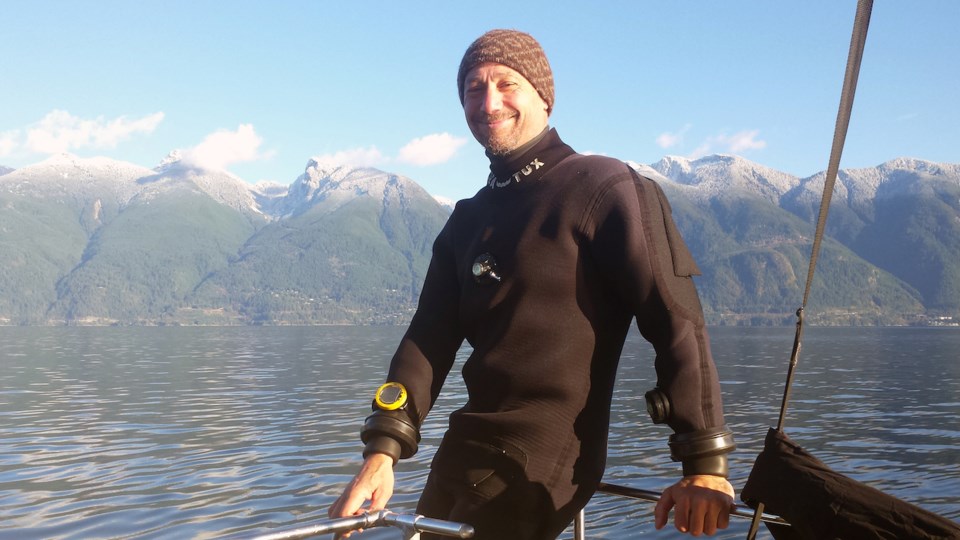In his new book, Changing Tides: An Ecologist’s Journey to Make Peace with the Anthropocene, Dr. Alejandro Frid confronts the future with scientific evidence and ancient wisdom. Although not a sequel to his earlier work, A World for My Daughter, Alejandro continues his quest for optimism in this lyrical book about climate change, biodiversity, environmental stewardship, and traditional cultures.
Alejandro works with the Central Coast indigenous Resource Alliance, an organization composed of the Wuikinuxv, Heiltsuk, Nuxalk and Kitasoo/X’ai’xais First Nations as an ecologist and science coordinator.
He makes his home on Bowen Island but, reading this first-person account, you get the feeling that he is equally happy working and recreating in wilder, more remote places.
Much of Alejandro’s research, interspersed throughout the book, was conducted off the central coast of B.C. where he studies marine resources and the synergistic effects of climate change and human activity on biodiversity. By turns, the writing is scientific and poetic. Alejandro deftly weaves scientific observations with stories of his family’s adventures kayaking, camping and hunting. When he writes about herring and rockfish, they appear to swim through the chapter, like allegorical figures, bringing news about Indigenous peoples’ cultures and values.
If you were raised knowing in your bones how all life is connected, this book reaffirms your perspective. If you needed a little clarity on that point, here is evidence that biodiversity matters. In fact, the case is made that Indigenous ways of understanding the world are critical for navigating life in the “Anthropocene,“ the geologic time period that many scientists say started in the mid-20th century with industrialized human societies.
Referencing Heiltsuk tradition and customary laws called Gvi’ilas, Alejandro writes that “the focus of resource management decisions should be on what is left behind, not on what is taken.” He gives examples of how relationships based upon the traditional values of ‘respect, gratitude, and reciprocity’ are contributing to real life cultural and ecological resilience today.
The wisdom inherent in the tenets of reciprocity, that you should “not take more than you need” and “focus on what you leave behind,” reminds me of Robin Wall Kimmerer, the author of Braiding Sweetgrass. As a botanist, professor and Potawatomi writer, she has the same talent of telling stories that bring the natural world, scientific findings and Indigenous traditions into alignment.
Both writers have sensitized me to the importance of protecting biodiversity in its myriad forms. Bees and wasps sting but they also pollinate. Invisible microorganisms create soil from waste and birds carry fish into the forest, fertilizing the trees we harvest for many purposes. As my awareness expands, I remember, “leave some behind, take only what I need” when I go fishing or foraging for mushrooms.
Some dreams and works of art move us in unexpected ways, eliciting emotional reactions and transforming our thoughts. Likewise, Alejandro’s stories have re-arranged my understanding of the world, forming a picture of how we humans can live in balance with each other and nature, without depleting resources or destroying cultures.
My favorite quote from the book is long, but it is a testament to the writer’s style and the book’s content:
“Developing the restraint and intentionality with which Coastal First Nations have conducted themselves in the world requires strong cultural norms that infuse the collective psyche of an entire society with a commitment for responsibility towards other species. These norms are codified into stories in which human and non-human worlds have fluid boundaries, intertwined by the powers of transformation.”
Changing Tides is both an antidote to fear and an inspiring call to action -- a reading adventure that is on par with Kimmerer’s Braiding Sweetgrass. Alejandro will be giving an author talk Sunday, December 8 at 2 p.m. at the Cove Commons Library Annex. Copies of Changing Tides can be borrowed from the Bowen Library or purchased at Phoenix.



